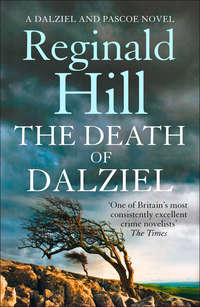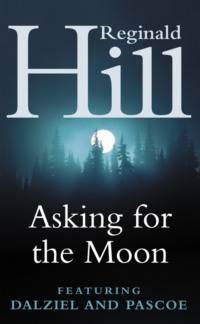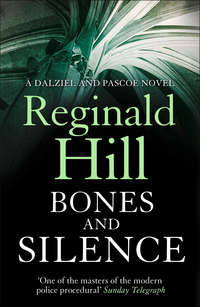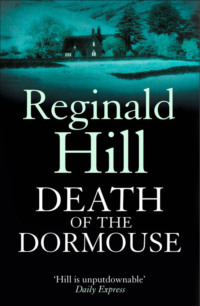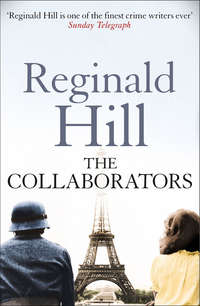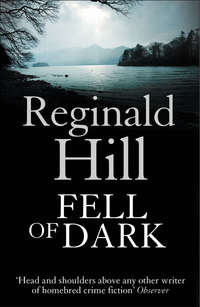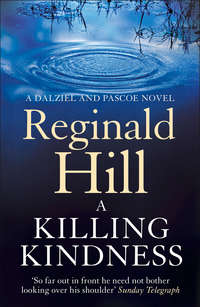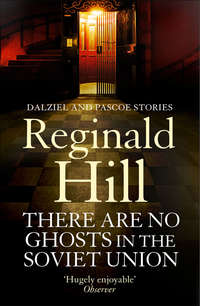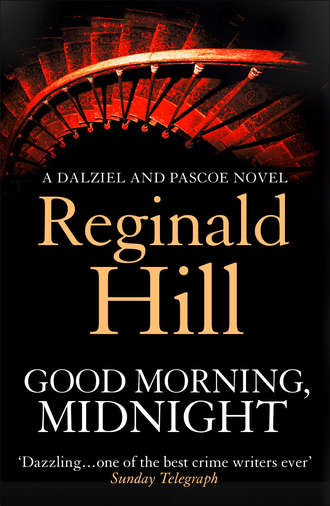
Полная версия
Good Morning, Midnight
‘Ah,’ said Pascoe.
For a moment there didn’t seem anything else to say. Then there seemed to be so much that he took another moment to marshal his words.
‘In his study … that’s the same room … and he had an open book on his desk?’
‘That’s right. But as I’ve not seen it yet and Bonnick says it were too covered with blood and brain for him to read the title, I can’t say if it’s the same book.’
‘But if it were, by which I presume you’d mean the same title not necessarily the same volume, what would that be?’
‘Book of poems. Funny little things. Some Yankee bint. Eleanor Dickson, summat like that.’
‘Emily Dickinson?’
‘That’s the one. Bit weird. Might have guessed you’d know her.’
Ignoring this aspersion on his literary taste, Pascoe was running through what little he knew about the Maciver family history already. He’d met Cressida a couple of times, found her somewhat over intense, and when foolishly he’d wondered aloud how Ellie had come to make a friend out of an aggressive man-basher who, every time she got drunk, attempted to rape her, he’d been lectured on not judging by surfaces. Underneath it all, he was told, Cress was really dreadfully in need of reassurance, and love, probably due to childhood trauma caused by the early death of her parents, which she never talked about.
‘I think she was heavily dependent on her brother and they’re still very close, but when he got married, that left a gap in her life. She’s always looking for a strong man to lean on. Trouble is, the bastards always keel over!’
None of this seemed relevant, so he said to Dalziel, ‘This is a copycat suicide then? That’s what brought you running?’
‘Strolling,’ said the Fat Man. ‘Aye, you’re right. Lightning striking twice and all that. Idle curiosity.’
Liar, thought Pascoe, not knowing why he thought it, but knowing he was right.
‘But it can’t be exactly copycat, can it?’ he said. ‘This Pal Maciver, the father, I mean, must have been a good bit older – family established, second wife.’
‘Mid forties,’ agreed Dalziel. ‘His lad must be – must have been – barely thirty. At university when it happened, I recall.’
‘And Cressida?’
‘Boarding school. Final year. She were head girl.’
‘That figures. And the younger daughter, Helen?’
‘The mobile incubator? She’d have been about nine. She were away in the States with her stepmother. That’s her you saw out there, the classy one.’
Pascoe noted the epithet. In Dalziel’s word-hoard, it usually signified approbation. ‘She still lives round here?’
‘Aye.’
‘Kay Kafka, wasn’t it? That her own name?’
‘No. She got married again.’
‘To someone called Kafka? That would be one of the Mid-Yorkshire Kafkas?’
‘Don’t be racist,’ reproved Dalziel. ‘I once knew a family of Chekhovs, had a farm near Hebden Bridge. Mind you, owt’s possible near Hebden Bridge.’
‘This Kafka, was he from Hebden Bridge then?’ pressed Pascoe.
‘No. A Yank. Her boss,’ was the short reply.
There was definitely something here, thought Pascoe. Something not said. He recalled seeing the pair of them meeting beside the ambulance. If she weren’t so slim, he’d have guessed that Dalziel fancied her. But it had long since been established that Mid-Yorkshire CID’s answer to God liked women in his own image, which was to say, with more meat on them than a Barnsley chop.
He said, ‘So what was the verdict?’
‘Suicide while the balance of his mind was disturbed.’
‘Disturbed by what?’
‘Summat at work they reckoned.’
‘And work was …?’
‘Ash-Mac’s, machine-tool factory on the Blesshouse Industrial Estate. Used to be Maciver’s. Pal Maciver’s dad, that’s our corpse’s granddad, founded it before the last war.’
‘Was he called Palinurus too?’
‘Liam. Came across from Ireland to make his fortune and didn’t do so badly.’
‘Why’d he stick his son with a name like Palinurus?’
‘Story is, back home Liam was a blacksmith, no education, but a lot of business sense. Made money some dodgy folk considered was rightly theirs, which was why he left. Came here, used his money to set up in business …’
‘As a blacksmith?’
‘Blacksmith makes things out of metal. Machine-tool business is just the posh end of blacksmithery. Any road, soon he were doing well, married a local lass, and decided he really ought to get himself an education. Got talking to some schoolteacher over a drink one night who told him the greatest literary work of the century had come out of Ireland and it were called Ulysses. You heard of it?’
‘Of course. Joyce.’
‘Aye, her. So Liam went off, determined to read all he could about this Ulysses, only when he asked at the library they got the wrong end of the stick and provided him with lots of stuff about myths and legends and the Trojan War and such, all of which he downed like a gallon of Guinness, and when his missus dropped a sprog, he looked for a name in this lot, and came up with Palinurus.’
‘Strange choice.’
‘Why’s that?’
‘He was Aeneas’s helmsman who dozed off at the helm and fell overboard.’
‘Oh aye. Drowned, did he?’
‘No, actually. He made it to the shore, the first of the Trojans to reach Italy. Only the natives didn’t like the look of him so they beat him to death and chucked him back in the sea.’
‘Well, there you go,’ said Dalziel. ‘Could be Liam thought it ’ud be a useful reminder to his lad every time he heard his name that, if he didn’t keep his eyes open, he could end up in a foreign land being shit upon by strangers.’
Pascoe said, ‘A little career advice with the paternal sex talk would have been more direct.’
‘He was Irish, remember. They don’t do direct. And back then I don’t suppose they did sex talks. But old Liam was right up to date when it came to making money. Lots of demand for machine tools during the war and in the post-war years. Everything seemed to be going his way. You’ll recall the other Mac? Mungo Macallum?’
‘The armaments man? Before my time, but I met his daughter, the pacifist.’
‘Old Serafina. Aye, I remember that. When Ellie got herself into bother with the funny buggers. Well, Mungo and Liam were sort of rivals for a bit, each looking for skilled men and cheap labour. Scotch Mac and Irish Mac they called them. But when Mungo died in the fifties and Serafina set about turning his business into money to finance her causes, Liam filled his boots. Plant, orders, workers, the lot. By the time his boy – let’s call him Pal Senior and the headless wonder back there Pal Junior, wouldn’t want your brain to overheat – when Pal Senior took over, the business were booming. Pal Senior had an education, nowt special but enough to set him up as an English gent. Did all the things gents are supposed to do, like tearing foxes into shreds and blowing small birds to smithereens.’
‘Which is how he had the shotgun to blow himself to pieces?’
‘Aye. Could’ve been one of the birds fought back, of course. No, we’d have noticed the birdshit. Gave all that up in his thirties when he had his accident.’
‘Shooting accident?’
‘No. As well as huntin’ and shootin’, he were a bit of a climber in every sense. Yon painting in there shows him at his peak – that’s a joke. You know how those mad buggers like to make life difficult for themselves. Well, he were the first to climb some Scottish cliff, solo, at midnight, on Christmas Day, bollock naked, or summat like that. It were on that mountain in the background. As you can see, him having his picture painted, he were chuffed to buggery. Ironic really.’
‘Why so?’
‘He went back next year and fell off. Broke this and that. Most of it mended, except his left leg. Couldn’t bend it after that. Not many mountains you can hop up, so it were goodbye to all that. Old Liam was failing, so Pal threw himself into the business, heart and soul. It was his pride and joy, and he was coining so much he were able to put a few down payments on a peerage with the Tories. But all that changed, both the coining and the payments, after seventy-nine when old whatsername started running around like a headless chicken, putting folk out of work. Suddenly it were like Maciver’s was falling off a mountain too. Order book empty, men laid off. Terrible times.’
‘Terrible,’ agreed Pascoe. ‘And this is when the takeover happened?’
‘Aye. It were looking like rags-to-rags in three generations when this Yank outfit, Ashur-Proffitt Inc, came sniffing round. Pal Senior had a choice between accepting their offer or seeing the rest of his workers laid off. So, no choice. Maciver’s became Ashur-Proffitt-Maciver’s, a.k.a. Ash-Mac’s, and Pal Senior got a fistful of dollars and a seat on the Board, executive director or some such thing. More of a face-saver than a real job, from the sound of it.’
‘And that got to him?’
‘So they reckoned,’ said Dalziel, yawning. ‘Lots of lolly and nowt to do, sounds like heaven to me, but.’
‘So what did you reckon?’ asked Pascoe.
‘Me? I reckoned he killed himself and that’s all I needed to know. He did it by himself, no one helped him. He weren’t hypnotized or under a spell or owt like that. Simple suicide.’
‘Oxymoron,’ said Pascoe. ‘Suicide’s never simple.’
‘Oxymoron yourself,’ retorted Dalziel. ‘From our point of view, it’s always simple. Forget the wherefores. The only question is, was it or wasn’t it unassisted suicide? If it was, no crime, so no investigation necessary. End of story.’
‘Except that Pal Junior back there’s written another chapter.’
‘Sequel, more like. Never as good as the original. I mean from the look of it, he couldn’t even be bothered to write himself new lines, just used his dad’s.’
‘What about old Liam? How did he die?’
‘Natural causes. Got his three score and ten in, so nowt to concern us there. All you need to do, Pete, is get this wrapped up with minimum pain to the living.’
‘One way or another, they seem quite capable of inflicting enough pain on each other,’ said Pascoe. ‘This Mrs Kafka, if she married a Yank, how come she’s still living round here? He doesn’t happen to work at Ash-Mac’s, does he?’
It was a shot in the dark, or rather in the twilight when you see things dimly without always being certain what it is you’re looking at.
‘Aye. Boss man. Here, isn’t that the ambulance?’ Dalziel said, cupping his ear.
It was, thought Pascoe, one of his more pathetic attempts at diversion.
‘I don’t think so,’ he said.
‘No? It’s old age. Plays tricks on the senses,’ said the Fat Man sadly.
Pascoe smiled. When Dalziel played the ageing card, a wise man hoarded his trumps. Then all at once his own ear caught the wail of a siren drawing closer.
‘Thought I heard it,’ said Dalziel complacently. ‘Nice to know the cavalry sometimes does turn up in time.’
Then came another sound which had both men jumping to their feet.
The piercing yell of a baby, indignant at being launched from its warm safe haven into a strange, cold world.
Now it became a duet.
‘So much for the cavalry,’ said Pascoe as they hurried down the stairs.
The front door opened to admit two paramedics at the same time as Ellie appeared in the doorway of the lounge. Her hands were bloody, her expression exultant. She could have posed for the Triumph of Motherhood, thought Pascoe. Or Clytemnestra on bath-night.
‘Twins,’ she declared. ‘Boy and a girl.’
‘Excuse us, luv,’ said one of the paramedics, pushing past.
‘Everything OK in there?’ said Dalziel.
‘Mother and babies doing fine,’ said Ellie. ‘I think they might want to take a look at poor Jason though.’
‘The dad? He ought to be out here flashing the cigars,’ said Dalziel. ‘Let’s have a look in the kitchen, see if there’s owt to wet the babies’ heads with.’
‘Sir,’ said Pascoe warningly.
‘Oh aye. Crime scene. Not to worry. I always carry emergency rations.’
He went out into the fog.
Ellie said, ‘Crime scene?’
‘Just a form of speaking. You OK, Mother Teresa?’
‘I’m fine. You look tired.’
‘It’s been a long day,’ he said.
Somewhere distantly a church clock began to strike midnight. In the muffling fog it sounded both familiar and threatening, like the bell on a warning buoy tolled by the ocean’s rhythmic swell.
‘And here’s another one starting,’ said Ellie.
1
the Crunch Witch
It was the first day of spring and Detective Constable Hat Bowler was lost in a forest.
It wasn’t an uncommon experience. He slept as little as possible these days, knowing that as soon as he closed his eyes he would reawaken among trees crowding so close they admitted only enough light to show him there was no way out.
Dr Pottle had nodded, unsurprised, and said, ‘Ah yes. The primal forest.’
It was Peter Pascoe who’d taken him to meet the psychiatrist.
Not that there was anything wrong with him.
After the death of … after her death … after …
After the woman he loved more than life itself had died in a car accident …
That had been on a Saturday in late January. He had turned up for work on Monday morning, no bother. Pascoe had taken one look at him and insisted he went to see his GP. The idiot recommended complete rest and psychotherapy. Hat passed this on to Pascoe, expecting him to share his exasperation. Instead the DCI had gone all po-faced and said if he didn’t follow his GP’s advice voluntarily, it would be made official and entered on his record, to be read by every member of every promotion board Hat ever applied to.
This was an empty threat to a man with no future. But he had neither the energy nor the will to resist, so he went to see Dr Pottle and answered questions about his dreams for much the same reasons.
The chain-smoking Pottle listened, his head shrouded like Kilimanjaro, then said, ‘If you ever did manage to get out of the forest, what is it you would hope to find?’
He couldn’t even bring himself to say her name which was a mark of how delusional he knew all hope to be.
‘Yes,’ said Pottle as if he had answered. ‘It can be a terrible thing, hope.’
‘Thought that was what you tried to give people,’ said Hat.
‘Oh no. Change is my game. But I never guarantee it will be for the better.’
Today – this morning, this evening, whatever time of dream it was – for the first time there was change. The trees stood far apart, a broad track wound between them and eventually he found himself walking through beams of hazy sunlight laced with birdsong which his ornithologist’s ear told him signalled morning.
At first he advanced rapidly, but soon began to slow, not because of any obstacle in his path but because he was finding out just how terrible hope could be.
So it was at the same time both huge disappointment and huge relief when he emerged from the trees into a sunlit clearing and found the path had led him to …
A gingerbread house!
He knew where he was. And he knew why his poor beleaguered mind had chosen to escape here. This was the land of childhood, a time before love and pain and loss.
Except of course in stories. It was Hansel and Gretel who got lost in the forest and found the gingerbread house. Only it wasn’t just a house, it was a trap, set by the dreaded Crunch Witch. You nibbled away at the gingerbread and she caught you and then you too got turned into gingerbread, ready to be nibbled at.
Well, tough tittie, Witch! He wasn’t hungry. And he didn’t like gingerbread.
With a heart almost as light as his head, he moved forward. Immediately a blackbird skulking under a blackcurrant bush stuttered its alarm call and Hat came to a halt as the Crunch Witch appeared in the house’s open doorway.
She was tall and square-faced with vigorous grey hair neatly coiled in a bun beneath some kind of small feathery hat. A pair of round spectacles, one arm of which had been repaired with sticking plaster, perched on the end of her slightly upturned nose. She was dressed in a sky-blue T-shirt and olive-green slacks tucked into black Wellington boots. No broomstick, though she did carry a rough-hewn walking stick which might serve in an emergency. This apart, she looked most unwitch-like. Indeed, there was something slightly familiar about her appearance …
Then the blackbird flew up and settled on her shoulder, and the little hat stood up on her hair bun and stretched its wings and he saw it was a great tit.
Dreams are like mad people – in the end they always give themselves away.
Reassured, and curious as to where this might lead, he moved forward again.
‘Good morning to you,’ said the Crunch Witch.
‘And to you,’ said Hat. ‘Lovely day.’
The closer he got, the more he realized that he was going to have to watch his step with this one. Spotting he wasn’t mad about gingerbread but loved birds, she’d changed the house into a simple thatched cottage, constructed of a dark orange brick with gingery tiles and birds flying in and out of the windows.
And there was more. Closer, he could identify the source of his feeling of familiarity. It lay in her sky-blue T-shirt, which bore an image of a small soaring bird and the legend Save the Skylark.
She said, ‘Snap,’ looking smilingly at his chest.
He glanced down to confirm that he was wearing exactly the same T-shirt.
‘Oh yes,’ he said.
He focused on the blackbird on her shoulder. It returned his gaze assessingly.
‘Does he talk?’ he asked.
‘Talk?’ she frowned. ‘He’s a blackbird not a bloody parrot.’
As if it too had been offended, the bird spread its wings and sprang straight at Hat’s head. He ducked, felt its beak tug through his hair and then it was gone.
‘Jesus,’ he gasped.
‘Shouldn’t walk around with twigs in your hair,’ said the witch. ‘Crackpot probably thinks you’ve been out scavenging nest materials for him.’
Hat put his hand to his head and realized she was right. There was quite a bit of undergrowth adhering to his hair, but at least he didn’t have a tit nesting there.
‘Crackpot?’ he said.
‘First time he came into the house he tried to perch on the handle of a cream jug. Over it went and broke. So, Crackpot. Now, how can I help you?’
He said, ‘I got a bit lost in the forest …’
‘Forest!’ This seemed to amuse her. ‘Well, if you’d kept on the track which goes around my garden, you’d have arrived at the road in a couple of minutes.’
‘Your garden?’ he said, looking round.
More magic. The clearing was now enclosed by a ragged thorn hedge with a ramshackle osier gate. Most of the ground was covered with rough grass, aglow with tiny daffodils, but alongside a lean-to greenhouse on one side of the cottage were the regular furrows of a small kitchen garden in need of work after the depredations of winter.
The witch said, ‘You don’t look too well, young man. Not had your breakfast, I bet. I’m just having mine. Step inside and let’s see if there’s anything to spare.’
Very cool! Disorientate him with the garden then lure him inside with food.
He said, ‘That would be nice, long as it’s not gingerbread.’
Show her he was on to her game!
She said, ‘Fortunately it’s not my first choice for breakfast either, but if you want a menu, you’d better find yourself another restaurant.’
She turned and went inside, walking rather stiffly and leaning on her stick.
Hat, feeling himself reproved, followed.
He found himself in a shady old-fashioned kitchen entirely free of anachronistic technology. His nose, sensitized by the chill morning air, caught a whiff of something vaguely familiar from his old life, quickly swamped by the delicious odour of new baked bread traceable to a rough-hewn oak table on which three tits were assaulting the dome of a cob loaf while a robin was doing its best to open a marmalade pot.
‘Samson, you little sod, leave that be!’ roared the witch. ‘Impy, Lopside, Scuttle, what do you think you’re playing at?’
The birds fluttered off the table but with little sign of panic. The tits settled on a low beam, the robin perched on the edge of an old pot sink, all casting greedy eyes back at their interrupted feast.
The witch picked up a long thin knife and Hat took a step back. But all she did was trim the pecked dome off the loaf then carve a thick slice from the remainder.
‘Help yourself to butter and marmalade while I mash a new pot of tea,’ she said.
She turned away to place a big blackened kettle on the hotplate of a wood-burning stove. Hat spread the bread thickly with butter and marmalade and sank his teeth into it. God, it was delicious! The best food he’d tasted in weeks. In fact the only food whose taste he’d noticed in weeks. This was a good dream.
One of the tits fluttered down on to the table and eyed him boldly.
‘Sorry, Scuttle,’ he said. ‘I’ve waited a long time for this.’
The witch glanced round at him curiously.
‘How did you know that one was Scuttle?’ she asked.
‘Two blue tits and a coal tit, not hard to guess which one’s Scuttle,’ he said.
‘So, apart from your problem with blackbirds and parrots, you do know something about birds. That what you’re doing out so early? Bird-watching?’
‘Not really,’ said Hat, thinking, You know exactly what I’m doing!
She turned to face him across the table.
‘You’re not an egg collector, are you?’ she demanded.
‘No way!’ he replied indignantly. ‘I’d lock those sods up and throw away the key.’
‘Glad to hear it,’ she said. ‘So if you’re not twitching and you’re not thieving, just what are you doing wandering round my garden so early in the morning? You don’t have to tell me, but unsatisfied curiosity only gets you one slice of bread and marmalade.’
She smiled at him as she spoke and he found himself returning the smile.
He certainly wanted some more bread, but what answer could he give?
He was saved from decision by the sound of a cracked bell.
‘Clearly my morning for dawn raids,’ she said.
The bell rang again.
‘Coming, coming,’ she cried, turning to open a door into a shady corridor that ended at another door, this one with a letter box and an upper panel of frosted glass against which pressed a face.
Hat sliced himself some more bread as she moved away. Even in dreams, a young cop had to take his chances. As he sank his teeth into it, he kept a careful eye on the Crunch Witch to see what reinforcements she may have conjured up.
She opened the front door.
A man stood there. He too carried a walking stick, this one ebony with a silver top in the shape of a hawk’s head, and he wore a black trilby which he removed as he said, ‘Good morning to you, Miss Mac.’
‘And to you, Mr W,’ said the witch. ‘Why so formal? You should just have come round the back.’
‘I’m sorry, it’s so early, I thought I’d better be sure …’
‘That I was decent? How thoughtful. But you know what it’s like at Blacklow Cottage: up with the birds, no choice about it. Come on in, do.’
She led the newcomer into the kitchen. He moved easily enough though with a just perceptible drag of the left leg suggesting that, like the woman’s, his stick was not simply for ornament. He stopped short when he saw Hat.
‘I’m sorry,’ he said again. ‘I didn’t realize you had a guest.’
‘Me neither till five minutes back,’ said the witch. ‘Mr Waverley, meet … sorry, I don’t think I got your name?’
‘Hat,’ said Hat. This little rush of names made him uneasy. Not Waverley, that had no resonance. But Blacklow Cottage set up some kind of vibration …
‘Mr Hat,’ said the witch. ‘Sit yourself down, Mr W. I’m just making a fresh pot of tea.’
She turned back to the stove. Hat studied Waverley openly and without embarrassment. (Pointless letting yourself be embarrassed in a dream.) Waverley returned the gaze with equal composure. He was in his early sixties, medium height, slim build, with a long narrow face, well-groomed hair, still vigorous though silvery, alert bluey-green eyes, and the sympathetic expression of a worldly priest who has seen everything and knows to the nearest farthing the price of forgiveness. He was wearing a beautifully cut grey mohair topcoat, which reminded Hat that despite the sunshine this was a pretty nippy morning.


